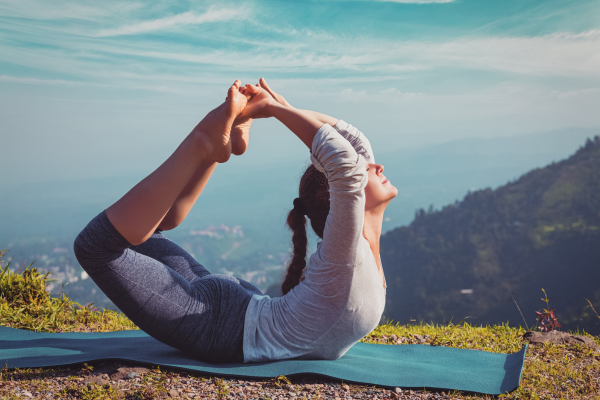Hatha Yoga, a timeless practice that originated in ancient India, is more than just physical exercise – it’s a holistic journey that embraces the body, mind, and spirit. Combining physical postures, breath control, meditation, and mindfulness, Hatha Yoga offers a path to balance, harmony, and self-awareness.
The Origins and Philosophy of Hatha Yoga
The term “Hatha” comes from the Sanskrit words “ha” (sun) and “tha” (moon), symbolizing the union of opposites. Hatha Yoga is grounded in the belief that balancing opposing forces within ourselves leads to a harmonious existence. It encompasses not only the physical practice but also the philosophical aspects that guide us toward self-realization.
The Physical Aspects of Hatha Yoga
Asanas: The Foundation of Physical Practice
Central to Hatha Yoga are its asanas, or physical postures. These asanas are designed not only to increase flexibility and strength but also to create a steady foundation for meditation. Each posture challenges the body while fostering mindfulness, encouraging practitioners to be present in each moment.
Pranayama: The Art of Breath Control
Pranayama, the practice of controlled breathing, is a cornerstone of Hatha Yoga. Breathing techniques are used to regulate energy flow, calm the mind, and cultivate a deeper connection between the body and the breath. By harnessing the power of prana (life force), practitioners gain insight into their own vitality and presence.
Introduction: Rediscovering Harmony through Hatha Yoga
In the bustling world of wellness practices, Hatha Yoga stands as a beacon of balance and serenity. This ancient discipline, originating in India, focuses on harmonizing the body, mind, and spirit. Join us on this journey to uncover the essence of Hatha Yoga and how it fosters holistic well-being.
Unveiling Hatha Yoga: A Holistic Path to Wellness
Hatha Yoga, an amalgamation of “ha” (sun) and “tha” (moon) in Sanskrit, embodies the balance of opposites. It emphasizes the equilibrium between strength and flexibility, activity and rest. Through a combination of physical postures (asanas), breath control (pranayama), and meditation, Hatha Yoga nourishes the body while calming the mind.
The Physical Benefits of Hatha Yoga
- Enhanced Flexibility: Regular practice of asanas gradually increases flexibility, reducing the risk of injuries and improving overall posture.
- Strength Building: Hatha Yoga engages muscles across the body, building strength and stamina over time.
- Stress Reduction: Mindful breathwork and relaxation techniques in Hatha Yoga alleviate stress, promoting a sense of tranquility.
Cultivating Mental Equilibrium
- Mind-Body Connection: The deliberate synchronization of breath and movement fosters mindfulness, creating a profound connection between the mind and body.
- Clarity and Focus: Through meditation and pranayama, Hatha Yoga enhances mental clarity, concentration, and emotional balance.
Embracing the Journey of Self-Discovery
- Awareness of Breath: Pranayama techniques, such as deep breathing, help individuals connect with their breath, promoting relaxation and presence.
- Physical Comfort: Hatha Yoga encourages self-awareness, teaching individuals to listen to their bodies and find comfort within each pose.
The Power of Pranayama: Breath as a Bridge
- Anulom Vilom: This alternate nostril breathing technique calms the mind, improves lung capacity, and balances energy flow.
- Ujjayi Breath: Known as “victorious breath,” Ujjayi encourages mindful focus, warms the body, and enhances concentration.
FAQs: Exploring Common Queries
Can Anyone Practice Hatha Yoga?
Absolutely. Hatha Yoga welcomes practitioners of all ages and fitness levels, offering modifications for individual needs.
How Often Should I Practice?
Consistency matters. Aim for 3-5 sessions per week to experience noticeable benefits.
Is Hatha Yoga Only Physical?
While Hatha Yoga includes physical postures, it also embraces breathwork and meditation for holistic well-being.
Can Hatha Yoga Help with Stress?
Indeed. The mindful practices of Hatha Yoga significantly reduce stress and promote mental clarity.
Is Hatha Yoga Suitable for Beginners?
Absolutely. Hatha Yoga’s gentle approach makes it ideal for beginners, gradually building strength and flexibility.
Can I Practice Hatha Yoga at Home?
Yes, practicing Hatha Yoga at home is possible. Create a calm space, follow tutorials, and prioritize safety.
Conclusion: Embracing the Balance of Hatha Yoga
In essence, Hatha Yoga is a journey of self-discovery, harmony, and well-being. Through a balanced combination of physical postures, mindful breathwork, and meditation, practitioners unearth the treasures of balance within themselves. Whether you’re a novice or seasoned yogi, Hatha Yoga invites you to nurture both your body and mind, fostering a sense of tranquility and alignment in a fast-paced world.

